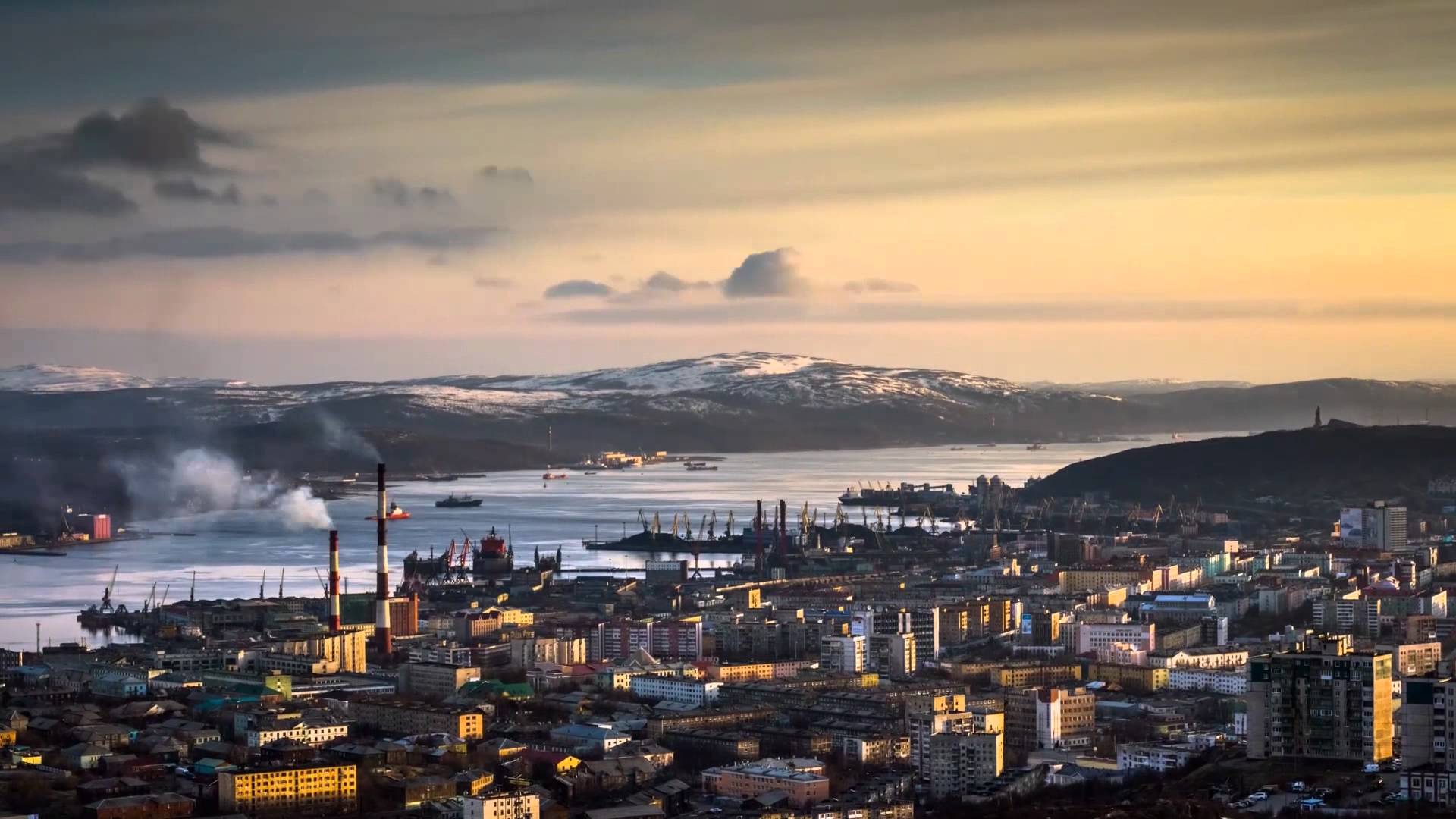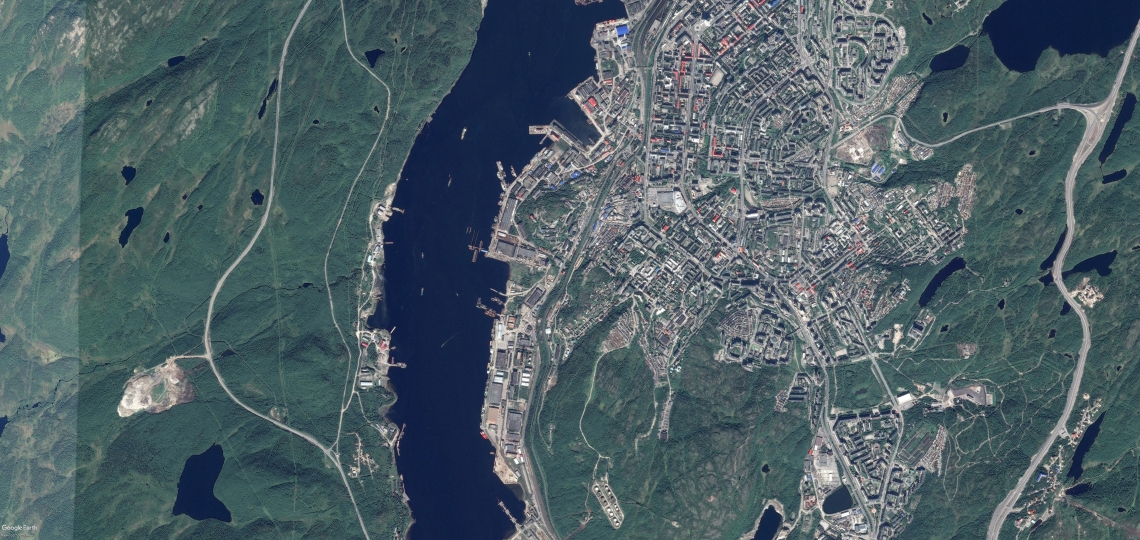
[dropcap size=small]Apadlock stuck on a railroad switch was enough to block Murmansk’s oil terminal for about seven hours, one of the latest episodes of a bizarre corporate conflict in one of the world’s northernmost cities.
Accounts by local media of the incident paint a picture reminiscent of the trade wars from the 90s, when coercion and violence were often the most efficient ways to wrest control of a business from its owners. Early in November, a group of men surrounded the railway in the morning and, after installing the padlock, stood guard next to the tracks to prevent the lock’s removal. The blockade – which prevented an oil shipment from leaving Murmansk First Terminal – lasted most of the day, until local police finally arrived to disperse the group. When asked about their identity, the men claimed to be from the Murmansk Fishing Port’s security service.
[alert type=blue ]Author: Fabrice Deprez is a journalist and contributor to BMB.[/alert]
The control of the railway, which snakes along the Kola Bay and around the city of Murmansk itself, has been at the heart of a conflict between Murmansk First Terminal, an oil storage facility, and the Murmansk Fishing Port, a struggling former state company that was privatized in 2015. A day after the incident, the Fishing Port published a long article on its website relaying the history of its conflict with the oil terminal and ending with the words “the port is ready to fight for the oil complex […] Perhaps it is time to pick up stones […] and evict this uninvited guest from a territory seized illegally!”.
The relation between the two firms was tainted from the start. Murmansk’s oil terminal is part of the fishing port and was leased to Murmansk First Terminal (MFT) until 2040, a move criticized by the current owners of Murmansk Fishing Port.
With the fishery in perpetual crisis, the loss of its most profitable asset – the oil terminal – in 2006 was a major blow, and not the only one: over the years, the territory of the fishery has become a complex corporate patchwork in which more than 80 companies lease various assets.
Later, MFT also leased the train station through which all of the port’s cargo travels, also previously controlled by the fishing port. Tensions soon mounted over whose goods should get priority when coming through that station, the Novorybnaya rail junction.
“The problem is that the bunkering of fuel is just one activity among many for the [fishing] port, along with the loading and unloading of cargo and other things. But all the key infrastructures have been leased for several decades to the oil terminal, which is exclusively interested in dealing with fuel,” a report on the conflict by a local blogger reads.
THE GREAT MURMANSK BLOCKADE
This clash of interests has surrounded the railway for several years, but grew more intense in November. On the 28th, the Murmansk Fishing Port published a press release dramatically titled “Blockade of the Fishing Port Has Lasted More Than 28 Days,” claiming MFT was doing the exact thing the fishing port is accused of – blocking the entrance of goods and fuel through its control of the railway. “The port’s losses,” the post reads, “[have] already reached 16 million rubles ($271,000) and continue to grow”. Three weeks before, the fishery had also accused MFT of blocking fuel tanks from reaching a boiler station, threatening to cut the heating to a dozen Murmansk families.

Fishing is not the business it used to be in Murmansk, with the port but a shadow of the Soviet powerhouse it used to be. Corruption, bureaucratic hurdles, higher costs and comparatively older infrastructure mean fishermen increasingly prefer to land their catch in neighbouring Norway, which has seen a steady rise in the volume of fish delivered. By contrast, Murmansk’s port saw its turnover continuously shrink since 2013, from 259,000 tons then to 179,000 in 2016. “The port’s first cargo area is practically dead, and the second is barely breathing,” local deputy Guennady Stepakhno said in 2015.
There were hopes that the port, a state property since the fall of the Soviet Union, could be revamped if put into private hands, but the company’s financial troubles and disputes with MFT only intensified after its privatization. Auctioned off for a billion rubles ($14 million) to a company boasting capital of just 10,000 rubles ($170) and created a month before the sale, it has not undergone any significant modernization since its sale in December 2015.

Instead, the new owners entered into a particularly vocal struggle with MFT, the local administration and several other companies over the circulation of goods near the port’s territory. In December 2016, the local branch of the Federal Antimonopoly Agency slammed the fishery for preventing a company leasing assets in the fishery from bringing its own transport vehicles in the port.
But the control of the railway remained they key point of tension. And in early November, a fairly uninteresting if unusual corporate conflict threatened to become one of public interest for a number of Murmansk families.
FISHY BUSINESS
On the 8th, Russian tabloid Komsomolskaya Pravda reported that six fuel tanks from the Fishing Port were being blocked by MFT, potentially leaving an entire city district without any heating. According to a representative of the fishery quoted in the article, the tanks were heading to a boiler station owned by the Murmansk Fishing Port (a leftover from the Soviet period, as the district used to house workers from the port) when their transit was blocked.
The heating cut did not materialize, but it rang alarm bells in a regional administration keen to prevent a corporate conflict from turning into a social one a few months before the presidential election.
A day after Komsomolskaya Pravda’s report, a meeting was held between the Deputy Governor, Murmansk City, and representatives of the fishing port, the oil terminal, and Russian railways to solve the conflict and allow the “unimpeded supply” of fuel oil. The local authorities’ irritation surfaced at a later meeting in November, when it accused the fishing port of “blackmail” and a refusing to fulfil its “social obligations”.
The port countered that the heating of a city district was unrelated to its fishing activities, as well as a financial burden for the company, vehemently denying any blackmail.
However, local media noticed a press release published on the port’s website back in January, in which it seemed to threaten to block fuel tanks heading to the boiler station. “By the way,” the release reads, “the port can also play in the war of blockade and bans […] It is expecting the arrival of 95 fuel tanks for the boiler station. And if they get stuck at Novorybnaya, it will hit not only the port, but also the oil terminal, and even the Kola [train] station. Moreover, this would jeopardize the heat supply of the Zhilstroi district in the heat of winter, which, you will agree, would be almost criminal!”
There is little hope that the conflict, which threatens to further marginalize the Murmansk fishing industry, will be solved anytime soon. Early December, Murmansk authorities asked the two companies to find an agreement on sharing the railway “in a civilized manner.” Predictably, no agreement has been reached so far.
[toggler title=”Source” ]This article was originally published by Bear Market Brief.[/toggler]


